- Home
- Don DeLillo
Great Jones Street (Contemporary American Fiction) Page 3
Great Jones Street (Contemporary American Fiction) Read online
Page 3
“I’m wherever you want me to be.”
“We know where you are at this point. We want to know what you’re doing here.”
“Nothing.”
“But why here?” he said. “Will you make a statement about that?”
“You know where you are in New York. You’re in New York. It’s New York. This fact is inescapable. In other places I didn’t always know where I was. What is this, Ohio or Japan? I wanted to be in one place. An identifiable place.”
“Okay, but you’ve got a studio-equipped house in the mountains and it’s almost inaccessible to anybody who doesn’t have a detailed map. We still don’t see why you’re here rather than there. You’ve lived there. It must be identifiable.”
“How tall are you?” I said.
“Six feet even.”
“Incredible.”
“It’s the way I hunch.”
“You’re a six-foot dwarf.”
“I hunch. I can’t help it. I’ve always hunched.”
“It’s really a studio-equipped mountain,” I said. “There is no house as such. There’s the facsimile of a house. There’s the pictorial mode of a house. Exactly what my house in the mountains would look like if I had a house and there were mountains. My present state of mind doesn’t accommodate the existence of mountains. I am in a plains mood.”
“Can we discuss your personal life?” he said.
“Sure we can. I won’t be here while we’re discussing it because I’m going out now. But you go right ahead. Everything you report will be true. I’ll personally vouch for every syllable.”
“Your manager told us you were approachable.”
“That wasn’t Globke you talked to. That was the facsimile of Globke. Transparanoia markets facsimiles. Everybody under contract has his or her facsimile. It’s one of the terms in the standard contract. Once you sign the contract, you’re obliged to live up to the terms. This is basic to a sound contractual relationship. At this precise moment in duplicate time, Bucky Wunderlick is having his toenails clipped in the Waldorf Towers. You’ve been conducting an interview with his facsimile.”
I could see myself reflected in his glasses as I rose from my bowl-shaped chair and moved slowly backward toward the door. He raised an arm in shaggy homage.
“Peace.”
“War.”
5
THE ROOM’S TENSIONS were suitable to few enterprises besides my own, that of testing the depths of silence. Or one’s willingness to be silent. Or one’s fear of this willingness.
The snow turned brown on the window ledge. There was soup to eat when the old stove worked. Things functioned sporadically; other things functioned all the time but never to full effect. Through large parts of many nights I sat with Opel’s coat around my shoulders. The little radio made its noises, fierce as a baby, never listening to itself. This was America’s mechanical voice, its doll voice, coughing out slogans into the dawn, testing itself in the event of emergency, station after station fading away in the suffering breath of the national anthem. The firemen stayed in the firehouse.
I heard a noise in the hall and put my head out the door. He was there, sitting on the top step, Fenig again, peering down at me through the dimness.
“I couldn’t write,” he said. “I got started on a science-fiction thing but it bogged down in the early stages. I tried to walk it out. You know, pace it out. Sometimes it helps, a simple thing like walking up and down a room. When the inspiration peters out, I get off my duff and start pacing. I pace certain ways, depending on the situation. This time I was pacing five steps north, around, eight steps southeast, over to starting point, five steps north again. It sounds stupid but it works. Do something over and over and soon little irregularities show up in the routine. Unconscious, unbidden. This is when you know you’re back in business. Come on up. I’ll show you my place.”
His room was sparsely furnished. It was dominated by an enormous trunk, balding with age, fitted out with huge rusty buckles and other types of metalwork. A rolled-up carpet lay against a wall. Fenig’s typewriter was set on a small metal table with wheels. The shade on a nearby lamp had a cup-and-saucer motif.
“This is where I live and work,” he said.
This was my first good look at Fenig. Because of the hood, his nose seemed larger perhaps than it really was, and since there is a sense of tragic destiny associated with people who have large noses, Fenig in his sweat shirt made me think of a gym teacher standing in a rainy playground while kids slash laughingly at his arms with improvised knives. We sat in old wooden chairs; on each one, several layers of paint were easily distinguishable in the manner of geological strata. Fenig himself appeared well kept, his clothes neat and recently laundered.
“Nobody knows me from shit,” he said. “But I’m a two-time Laszlo Piatakoff Murder Mystery Award nominee. My one-acters get produced without exception at a very hip agricultural college in Arkansas. I’m in my middle years but I’m going stronger than ever. I’ve been anthologized in hard cover, paperback and goddamn vellum. I know the writer’s market like few people know it. The market is a strange thing, almost a living organism. It changes, it palpitates, it grows, it excretes. It sucks things in and then spews them up. It’s a living wheel that turns and crackles. The market accepts and rejects. It loves and kills.”
Light entered mildly, the only wage a northern winter pays to moderation. A corner of the room began to shimmer, the sun raising dust in uncertain columns, and I realized I was still wearing Opel’s coat. Fenig in his cotton-acrylic hood. Wunderlick tucked in at the waist, baring his bony wrists.
“There’s a woman lives downstairs,” he said. “First floor. Micklewhite. She’s got a kid about twenty, deformed and retarded. He was born with something wrong with his skull. It’s soft for some reason. His head is full of dents and funny little configurations. His family was ashamed and they never did anything. They just kept him in the room. Now the father’s dead and the mother’s nutty and the kid is still in the room with his pliable head. He can’t talk or dress himself or anything. I don’t know if he can even crawl. I’ve never seen him myself. She doesn’t exhibit him around. But she told me everything. Micklewhite and her all-American boy. I’ve put him in four stories, sight unseen.”
The radiator was similar to the one in the room below, a tall stooped object standing in a corner, wholly reconcilable with its surroundings or lack of them, nice to look at and even listen to, the kind of radiator that has a metal receptacle hooked to its back for the purpose of holding water and moistening the air. Our matching radiators. Something to water once in a while.
“Fame,” he said. “It won’t happen. But if it does happen. But it won’t happen. But if it does. But it won’t.”
The building was pounded by shock waves from an explosion at a construction site nearby. I watched Fenig’s jowls quiver a bit, all the loose skin on his face agitated by the tremor, a disquiet at the center of his neatness and calm. There was no sign of a radio, telephone or television set.
“I met Laszlo Piatakoff at a Baskerville Society dinner thing at the Hilton.”
“Who is he?” I said.
“Laszlo Piatakoff is the Marjorie Pace Kimball of murder mystery. That’s no exaggeration.”
Down on the street someone was using a hammer. The sound was vibrant, accompanied by liquid echoes, and soon it was joined by the sound of another hammer, maybe a block away, a thick ripple to each granulating blow, probably Bond Street. The heavier of the two sounds was the more distant, and together they formed a slowly spreading wake, one of time, silence and reverberation, each of these flowing through the others, softening the petrified air, until finally one hammer was rested, and the other grew brutal.
“Everybody knows the thing about an infinite number of monkeys,” Fenig said. “An infinite number of monkeys is put to work at an infinite number of typewriters and eventually one of them reproduces a great work of literature. In what language I don’t know. But what about an infi
nite number of writers in an infinite number of cages? Would they make one monkey sound? One genuine chimp noise? Would they eventually swing by their toes from an infinite number of monkey bars? Would they shit monkey shit? It’s academic, you say. You may be right. I don’t know. One thing I do know. It’s all a question of being in the right place at the right time. Knowing the market. Spotting its fluctuations. Measuring its temperament. I’ve written millions of words. Every one of them is in that trunk.”
When I went downstairs I had to content myself with fashioning an impersonation of sleep, eyes closed, body lax, a studied evenness to my breathing. This, in the end, became tiring, and I ate some food and then sat by the window. The air carried a dismal stench, some kind of earth gas released by the detonations. I closed my eyes again. When I opened them it was well into evening. The room behind me was dark. I thought of opening the window and shouting;
“Fire! Hey, fire!”
The great doors of the firehouse would slowly come open. I’d get a glimpse of the big machine, fire-engine red, rigged with shiny appliances. Then tiny men in black booties would appear, edging out onto the sidewalk, lifting their beady eyes to my window.
“Fire!” I’d shout. “Hey, fire, fire!”
One small man would take several steps forward, moving into the light shed by a streetlamp. He’d tug at his booties for a second. Then he’d look back up at my window.
“Water,” he would say, barely above a whisper.
A moment would pass and then his little comrades, standing all around him now, would commence whispering, as if by prearranged signal:
“Water, water, water, water, water.”
Finally all the tiny men would return to the firehouse and the vaulted doors would slowly close behind them.
6
A TELEPHONE that’s disconnected, deprived of its sources, becomes in time an intriguing piece of sculpture. The business normally transacted is more than numbed within the phone’s limp ganglia; it is made eternally irrelevant. Beyond the reach of shrill necessities the dead phone disinters another source of power. The fact that it will not speak (although made to speak, made for no other reason) enables us to see it in a new way, as an object rather than an instrument, an object possessing a kind of historical mystery. The phone has made a descent to total dumbness, and so becomes beautiful.
Opel’s phone was out of order and Azarian came down without calling and was waiting for me in the hall, numbed by cold, when I got back from Thirteenth Street, where I’d gone to buy some clothes. He stood against the mailboxes, arms strait-jacketed in crushed velvet. Somehow he managed to invest the simple act of sniffling with an element of gravest accusation. I led him upstairs. Without uncrossing his arms from his chest, he dropped into a chair.
“The apocalyptic crotch himself.”
“Don’t be funny,” he said. “Do that one thing for me, Bucky. Avoid all funny stuff. I’m cold and tired. I need to be talked to seriously. Jet lag, fear, anxiety, depression. You know my history.”
“Want some cocoa? Good and hot.”
“Sure, yeah, okay.”
“I don’t have any.”
“I thought you were with Opel Hampson in Morocco.”
“Is she in Morocco?” I said.
“Globke finally told me you were here.”
“How about hot tea? Steaming hot Lipton’s tea. Fresh from the grocer’s shelf.”
“Do you have any?”
“No.”
“Frankly I wasn’t knocked out by grief when you left, Bucky. But I was wrong. We kind of need you. The last year or so I’ve been in a state of deep fear nearly one hundred per cent of the time. All kinds of fears of this and that. Mostly unexplained fears. When you left the group I frankly expected the anxieties to lift like a fog. But I was wrong. I’m more afraid than ever. All the tremendous tensions you created with your presence have gotten even worse now that you’re gone. I’m afraid all the time.”
“Afraid of what?”
“You know my history,” Azarian said. “Fears, anxieties, apprehensions, dreads, terrors, cowerings and panics. Don’t ask me afraid of what. Afraid of everything, I guess. Everything, nothing, something, anything. I came east for a reason. Really two reasons. Both pretty scary.”
“Tell me.”
“First I want to know your intentions. I feel I have a right to that. The band’s in flux. Before I can take any definite action and relieve my mind of some of the fear, I have to know whether or not you’re thinking about returning. Some idea of your state of mind would be a great help to me at this point. They thought you’d been murdered. Dodge actually thought that. I told him he was crazy. So we talked to Globke to get some kind of idea. We talked to him together. Then we talked to him one by one along the line at different stages. He didn’t tell us anything definite till last night. So I came in from Phoenix. Rotten shitty flight. Dodge’s mother’s been trying to contact you. She’s some kind of whatever-you-call-them. Beyond the grave. See, Dodge told her you were dead. So she tried to contact you.”
“Any luck?”
“She got your brother, she said. Did you ever have a brother?”
“No.”
“That’s what Dodge told her. Weird fucking woman.”
“I’m kind of busy,” I said. “If you could tell me what you want.”
“Busy doing what? What could you be doing in a place like this that you could call busy?”
“Tell me what you want,” I said.
“I want to know your intentions. I want to know if you’re coming back, and when, and in what exact role. In what capacity. Let’s face it, you haven’t done anything new in a long time and pressure’s been building up over that fact and in the meantime I’m ready to go into a studio with material I’ve been working on for about the last two years that we’ve never recorded. I’m ready for a whole lot of things. But I can’t just go ahead. I’m tied down by prearrangements, by clauses, by small print, by multiple deals and counterdeals. Everything’s locked up tight. So this is the necessary first step. Finding out your intentions.”
“I have no intentions.”
“You do so have intentions. Everybody has intentions. Looks like I was right about you.”
“In what way?”
“I told them you cracked up,” he said. “Dodge was running around with the murder story. They all believed him. I told them you just ran off to hide. You cracked up. You couldn’t take it anymore and you went off to Morocco to hide. I told them that.”
“You were mistaken.”
“Dodge said Bucky’s not the type. Last man to crack’ll be Bucky. We’ll all fall apart but not him. Well, bullshit, they were wrong. I saw what happened in the lounge in that airport, wherever we were, Denver, just before the Astrodome riot.”
“What happened?” I said.
“I saw what happened.”
“What happened?”
“I didn’t tell anybody because I figured it was your own private business. I didn’t even tell them after you disappeared and they were going around believing you’d been murdered. You cracked up pure and simple. I told them that much but nothing else.”
“What happened?” I said.
“It caught my eye in all that crush just before we boarded. You were on your knees making faces at some old woman in a wheelchair. I knew it wasn’t a joke. It was too unreal for that. You were sweating and babbling and making incredible unreal faces at the old woman. I’ve never seen anyone sweating the way you were. Laughing and babbling and down on your knees. Laughing-crying. I’ll never forget it. A few other people saw it too but nobody knew how to react. It was too unreal. And besides you were in tears. So nobody knew what was what. There was no reality. There was no way to know what to do. Then somebody wheeled the old lady away and you got up and it was over.”
“Strange.”
“You hadn’t said more than five words in about a week and a half, Bucky. I mean the whole grinding insanity of the tour. I mean the incredible sic
k aspects of it. I mean the whole morbid fantasy. This could smash anybody into little pieces. And being who you were, of course. That whole other myth. Who you were and what you represented. That particular inhuman pressure. When I first saw you on the floor like that, it didn’t really seem that unusual. I knew it wasn’t a joke but I didn’t think it was serious either. I mean that’s the tour. That’s what happens on the tour.”
“Strange,” I said.
Azarian’s sadness filled the space between us. He leaned forward in the chair now, exploring my eyes, trying in his intensity to make me remember, to make me see my own face, as if this remembering could be a clean breeze through his sadness. He clenched both fists, lined them up against his lips and blew heat and energy into the resulting tunnel.
“That brings us to reason number two why I’m here,” he said. “Happy Valley Farm Commune is holding something I’m willing to lay out money for. I represent certain interests. These interests happen to know you’re in touch with Happy Valley. So they’re making the offer to you through me.”
“Make your offers to the people directly involved. I don’t want to know anything about it.”
“They’re an armed camp. I wouldn’t go anywhere near them.”
“Your problem, not mine.”
“Look, Bucky, you and I know each other a long time. That’s why these certain interests want me representing them. It makes sense for you and me to do the business in this particular situation. I don’t want to go anywhere near Happy Valley. I just want to bid on the product they’re holding. I’ll make the offer. You take it from there.”
“I don’t know the first thing about these people.”
“Your people or my people?” he said.
“My so-called people. I don’t know anything about them.”
“Okay, the group was a rural group that merged with other groups or splinter groups and got hassled everywhere they went and so they kept moving and eventually over the years they ended up in the city, this city, right here, within walking distance, Bucky, walking distance of right here. In other words they’re a rural group that came to the city to find peace and contentment.”

 Great Jones Street (Contemporary American Fiction)
Great Jones Street (Contemporary American Fiction) Americana
Americana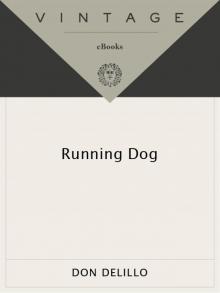 Running Dog
Running Dog Libra
Libra End Zone
End Zone Ratner's Star
Ratner's Star Underworld
Underworld White Noise
White Noise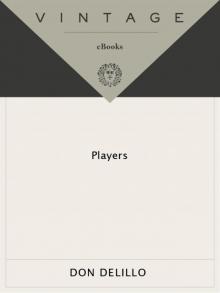 Players
Players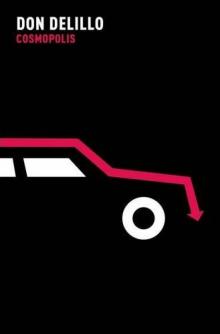 Cosmopolis
Cosmopolis The Silence
The Silence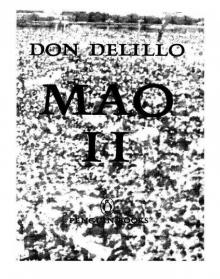 Mao II
Mao II Zero K
Zero K Great Jones Street
Great Jones Street The Angel Esmeralda
The Angel Esmeralda The Names
The Names The Body Artist
The Body Artist Point Omega
Point Omega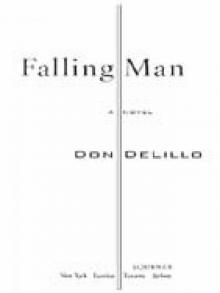 Falling Man
Falling Man